#the fat controller
Text
I often wonder about the crews of the rws/ttte universe and what they're like and how they handle the shit their engines pull especially in specials where like. Really insane things happen.
For instance. Does Frankie and Hurricane kidnapping Thomas also count as them kidnapping his crew. can the fat controller sue the steelworks and its employees for trapping his employees as well as his engines. Many such cases.
#live from tidmouth#talk from the tracks#ttte#thomas the tank engine#thomas and friends#thomas & friends#jbs#journey beyond sodor#ttte crew#ttte the fat controller#the fat controller#ttte thomas#ttte frankie#ttte hurricane#do not get me started in bwba.#WERE THE CREWS ALSO ON THE SHIP JUST CHILLING OR DID THEY USE AN AIRPLANE AND WAIT A BIT FOR THEIR ENGINES TO COME#i <3 logistics. btw.
78 notes
·
View notes
Text
sometimes i look like i’m driving safely but i’m actually thinking about how topham hatt is such an underrated character
#he’s Blorbo#free my boy yes he did do all those things plus a lot more canon barely acknowledges but that’s what makes him interesting?#also i kinda love the fat representation#he’s shrewd and active and formidable so he makes a good subversion#ofc sometimes he royally fucks up and i like that too <3#blorboposting#ttte#the fat controller#fantasy capitalist bae <3#(emphasis on fantasy lol. sometimes ya need one. To Cope™️)
76 notes
·
View notes
Text
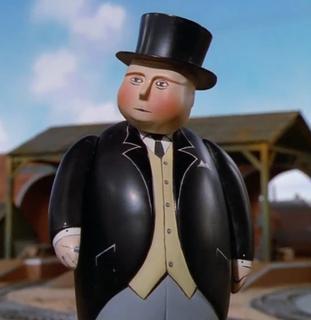
The Fat Controller AKA Sir Topham Hatt from Thomas and Friends is an Avatar of the Slaughter.
#the fat controller#sir topham hatt#thomas and friends#thomas the tank engine#the magnus archives#tma#tma headcanons#avatar of the slaughter
55 notes
·
View notes
Text
Found this on Twitter. Made me cackle
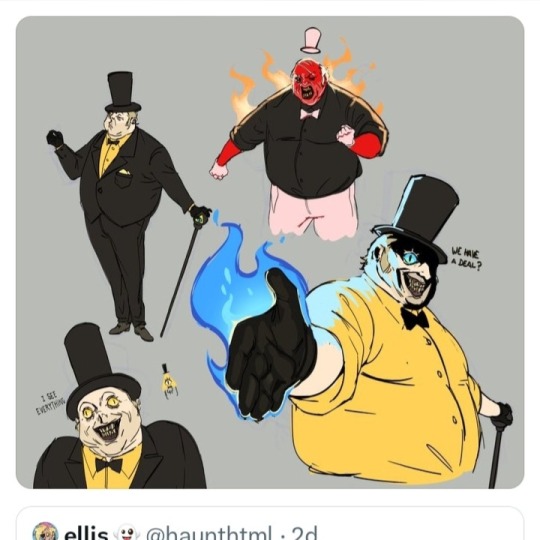

58 notes
·
View notes
Text

A scene from the Railway Series story "Thomas' Christmas Party"!
Not as polished as I'd like - got a bit too ambitious for the limited time I had to work on this ^^;
Still, I hope you all enjoy, and have a very Merry Christmas!
#The Railway Series#RWS#Thomas The Tank Engine#Christmas#Party#Illustration#Digital Art#Train#Children's Book#Art collab#Steam Engine#Steam Locomotive#Thomas#Edward#Henry#Gordon#James#Percy#Toby#The Fat Controller#Sir Topham Hatt#Mrs Kyndley
66 notes
·
View notes
Text
"Douglas, I'm pleased with you. Oliver, Isabel and Toad will soon be ours. Oliver and Isabel are just what we need for Duck's branch line!"
From the story Little Western in Railway Series book 23: Enterprising Engines.

#thomas the tank engine#ttte#ttte fanart#ttte thomas#thomas#thomas and friends#the railway series#rws#ttte douglas#sir topham hatt#the fat controller#james the splendid engine#james the red engine#duck the great western engine
74 notes
·
View notes
Text
I have a fic/au idea that I don’t have the spoons to write in full prose right now, but I’d like to put it out there.
So. Henry arrives on Sodor and an outraged Fat Director demands to know who built him. Henry tries to answer all his questions, but he soon realizes he doesn’t know much about his builders either.
He first came to in a damp shed with boarded-up windows. He never made out any faces, only ever hearing low voices around him. This was done to keep him from identifying anyone involved.
Once this is clear to Henry, it eats away at him. All the other engines on the NWR know their builders, their inherited legacies, and their engine families (siblings, cousins, etc.). Even worse, he’s not the engine the Fat Director wanted. He can’t help any of this.
…but he can figure out who his builders are. And maybe being able to answer those questions would make the Fat Director a little less angry with him. Maybe he could find out what family he might have out there. Maybe he could get an explanation from them.
So Henry asks engines coming in from the Mainland for info, with Edward and Thomas also asking around for him. The crew assigned to Henry sees how much this matters to him, and, growing fond of him, write letters to the place Henry was built.
They don’t make much progress, however, until Gordon arrives.
Gordon and Henry both feel very shaken when they see each other. Their designs are so close that it can’t be coincidental.
Their investigation is impeded somewhat by Gordon not wanting to associate with Henry. For him, it’s uncomfortable to acknowledge an engine so similar to him and yet so wrong. He looks at Henry and sees what could’ve been his fate, as an experimental prototype. And that doesn’t even go into the blow to his Gresley lineage and prestige as which he perceives Henry.
But then it only makes sense, a bitter Henry argues, for Gordon to disprove the idea that Henry’s a real Gresley engine. And so Gordon relents (with some sternness from Edward and some scowling from Thomas as well).
Gordon then admits when they question him that some plans went missing from Doncaster. It was before his time, but he overheard some people still speculating about who could’ve done it.
He says nobody saw the plans as a great loss — that they were rejected for having too small of a firebox for a locomotive of that size.
But as Henry and his crew begin looking into who stole those plans, suspecting a rival of Gresley, things go wrong with his trains. Things like loosened couplings, damaged track that was fine an hour ago, and trucks catching fire.
It’s all sabotage. Henry has become a liability to his builders by trying to expose them. And seeing as they already got the money from his sale, they have no further need of him.
Henry is horrified, make no mistake, but he’s also angry. He’s done with this nonsense. He wants to see his builders face-to-face, to draw them out, to get some kind of explanation from them.
And so he makes the impulsive decision to stop in a tunnel.
He’s miffed that the Fat Director matches his expectations and bricks him up, but not surprised. He does his best to explain himself to his crew once the hullabaloo dies down. But as he lays out his idea, his confidence wavers.
He’s not sure if he can face the people who built and then abandoned him. He’s not sure if he’ll come away from this safely. And even if does, he’s not sure he hasn’t burned every bridge on this railway and any hope of a future here. Can he trust anyone here?
He doesn’t tell them this, though. It’s too late to go back. He can only see this through.
That night, some strangers approach Henry’s tunnel. They’re his builders. They’re here to dispose of him. He finally sees their faces, even if he can’t put names to all of them.
The way they talk to him confirms that they never cared about him. He was always a means to an end. He was always one of a kind, the product of a jealous grudge against another engineer.
And yet it doesn’t hurt the way Henry thought it would. He sees them and feels no connection, no obligation to them. He realizes they’re not and never were his family — that he never had to please or live up to them.
So when they give him one last chance to shut his mouth, to keep quiet about who they are, he laughs in their faces.
He takes great satisfaction in telling them they can’t command any kind of loyalty from him. He knows he could never trust them and he’s fine with that, because he feels nothing for any of them now. He doesn’t need them.
The only thing that scares him is the thought that he won’t get away from this. As the builders advance on him, he thinks that he’s grown fond of Sodor and this ridiculous railway. He wants to roll his eyes at Thomas’ quips, to watch the sunrise with Edward. He might even want to bicker with Gordon. He wants a future here.
And then his crew leaps out of hiding, getting into a scuffle with the builders.
It’s long enough for Thomas to come barreling down the line, followed by Edward and Gordon. They bring the police, having been informed of the “stake-out” plan… and the Fat Director steps off Thomas’ footplate, too.
The builders are summarily subdued and arrested, and all the engines and crews ask Henry is he’s alright. (Well, Gordon does so in a very roundabout, emotionally constipated way, but he still asks.) Henry is overwhelmed. He was right to trust them, it seems. He could more than trust them.
Henry and the Fat Director then hash things out. It’s a tense and messy conversation, especially because Henry is still reeling from the events of the night so far. But the Fat Director says that, regardless of his own opinions, it’s clear the rest of his engines and workmen would riot if he turned Henry away now. And he can’t afford that.
“You are needed here,” he says. It’s not quite an apology, but it’s close — an undoing of the bricks between them. “You are useful.”
Henry doesn’t say thank you, because this is the bare minimum. “Yes, sir,” he says, trying very hard not to cry anyway.
And so Henry is let out of the tunnel and remains on the NWR. It’s not perfect — far from it, sometimes — but it’s home. It gets better over the years. Decades pass before the Thin Clergyman starts asking around for the story of Henry’s tunnel.
By now, not many people know about what really happened. The knowledge of Henry’s leading designer would’ve torpedoed a workshop’s reputation, one which turned out to be uninvolved in what one of its designers did in his free time. Many people would’ve lost their jobs and locomotives would’ve lost the ability to find homes. So in the end, the scandal was hushed up and the builders were charged on the more minor offenses they committed.
For that reason, Henry and the others quickly rule out telling the truth. Nor does Henry want to revisit that time in his life. He doesn’t want to be associated with his builders in any way.
Thomas’ cheeky suggestion about him not wanting the rain to spoil his paint isn’t very flattering, but the others’ suggestions are even worse. (Edward’s idea of Henry being in the tunnel for a heroic reason is outvoted, though Henry appreciates it.) He also has to admit the Fat Director doesn’t look much better in that version of events — he looks arguably worse than Henry.
Is it petty? Yes. Does Henry go along with it anyway? Yes.
The Fat Director, now the first Fat Controller, accepts this without comment. He’s learned and grown quite a bit since the early days of his railway. He’s not the same man who bricked up Henry; he doesn’t think it’s worth getting so worked up over a small dig at him. (And while he’d never admit it, he thinks it’s a way to somewhat atone for his part in it all.)
But even if the Fat Controller did get upset, Henry wouldn’t be afraid in the slightest. He knows the engines here have his back. He knows he’ll always have his family.
#I’m a little nervous posting this tbh#so many people have great takes on Henry and his struggles#I couldn’t hope to top any of that#but I wanted to throw my hat into the ring#so I hope you guys like this or at least think it’s interesting!#ttte#rws#ttte au#my au#rws au#ttte henry#ttte gordon#ttte edward#ttte thomas#ttte engine crews#the fat controller#tw: attempted murder#(but not in graphic detail nor successful)#(there is a happy ending here)#long post#long reads
127 notes
·
View notes
Text

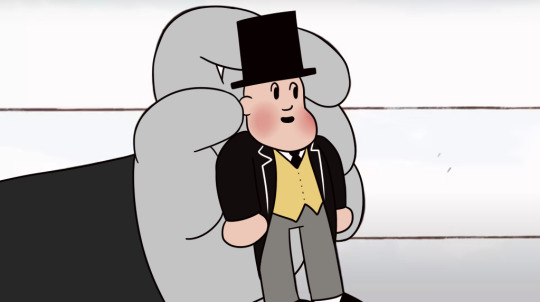
no much luck in the gacha, eh?
#vriska universe#vriska undertale#vriska serket#asuka langley soryu#sir topham hatt#ttte#the fat controller#thomas and friends#xd
133 notes
·
View notes
Note
For your art request post can you draw Edward comforting a sad Thomas and him going protective papa on whoever made him cry?
Also am a huge fan!
Omg you’re so sweet ah yes does this count?? A part two to this post from earlier >:)
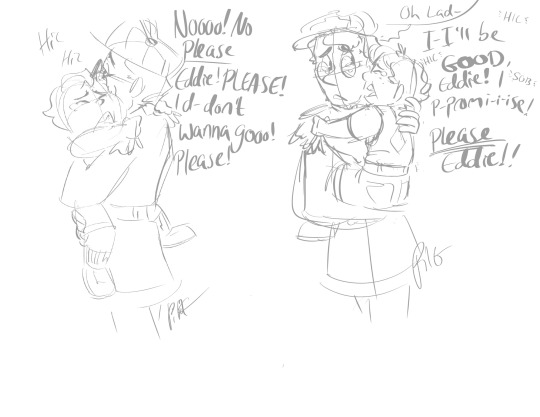
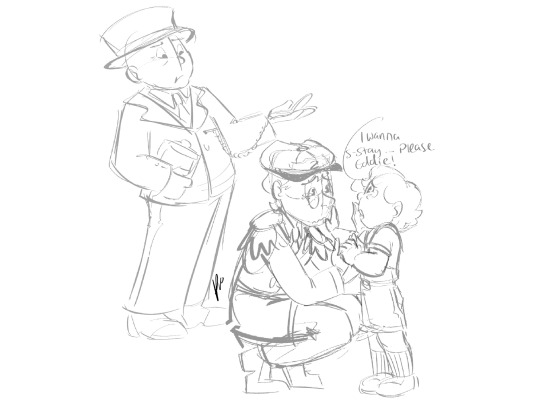
“Oh… sir-“
“He’s going to miss his train, Edward.”
“But sir!”
“The orphanage is expecting him, we knew he wasn’t going to stay here forever-“
Except then he did and lived happily ever after >:,D
#ttte fanart#ttte#ttte Thomas#ttte edward#ttte sir topham hatt#sir topham hatt#the fat controller#thomas the tank engine#Thomas and friends#human ttte#human#art#pilots art!#pilot speaks!
211 notes
·
View notes
Text
Sir Topham Hatt 🤝 Tom Nook
Fat Authority Figures in children's media who are often demonized as "evil dictators" when in reality they are looking after the main characters and just want them to be more responsible with their lives
#wysty's thoughts#animal crossing#tom nook#animal crossing tom nook#thomas the tank engine#sir topham hatt#the fat controller#i'm not the only one who noticed this right?#they both get so much slander by people outside the fandoms and it's unfair#plus they're both silly at times too#I WILL DEFEND BOTH WITH MY LIFE!!!
57 notes
·
View notes
Text
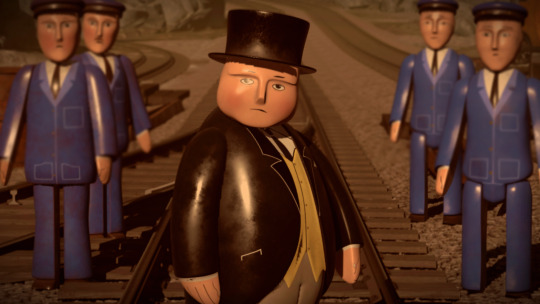
When The Fat Controller inspected the damage he decided to close the mine. Then he looked at Boulder...
"We should have left this side of the Island... Alone..."
#ttte#trainz#thomas the tank engine#thomas and friends#rusty and the boulder#the fat controller#sir topham hatt
31 notes
·
View notes
Note
Well, here's a question: If TFC1 and 2 were engines (tank and SB5 Respectively) How well do you think their relationship would be?
I'm not sure what an SB5 is?
I love the idea of Hatts as engines, especially if it's a spontaneous, uncontrolled transformation. But FC1 and FC2's relationship in engine form depends a lot on what you think their relationship is in human form! We really don't know a ton about it to begin with. Much to consider.
31 notes
·
View notes
Text
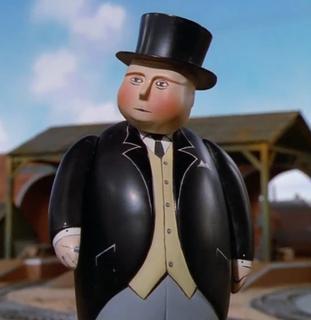
The Fat Controller AKA Sir Topham Hatt from Thomas and Friends is an Avatar of the Dark.
#the fat controller#sir topham hatt#thomas and friends#thomas the tank engine#the magnus archives#tma#tma headcanons#avatar of the dark
28 notes
·
View notes
Text
I rebuilt Sir Topham Hatt's Season 1 theme and put it through MidiTzer
#ttte sir topham hatt#sir topham hatt#thomas the tank engine#ttte#thomas and friends#topham#the fat controller#miditzer#my midi#midi
42 notes
·
View notes
Text

Troublesome Engines
#Thomas The Tank Engine#The Railway Series#TTTE#RWS#Thomas And Friends#Thomas#Edward#Henry#Gordon#James#Percy#The Fat Controller#Illustration#Train#Steam Engine#Steam Locomotive#Fanart
119 notes
·
View notes
Photo
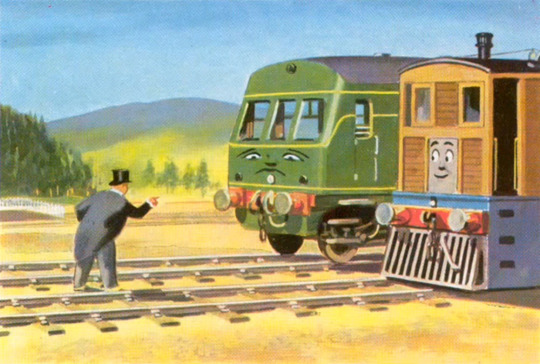
One morning, the Fat Controller came to the Top Station to meet Daisy.
“I need you to go to Edward’s Branch Line for the Summer,” he told her, “He needs help with the extra passengers.”
“I won’t, Sir.”
The Fat Controller stared. “I’m sorry?” he asked kindly, hoping he’d misheard her.
“I won’t go, Sir.” Said Daisy. “Edward’s Branch,” she squirmed fearfully, “it’s haunted by demons. I’d be happy to help Edward, Sir, but I have no interest in being plagued by the supernatural.”
The Fat Controller looked in disbelief. “Where,” he asked, “Did you hear such a preposterous idea?”
#ttte#rws#the fat controller#ttte daisy#rws art#bootlace drabbles#daisy's heard the horror stories of bill & ben and wants None Of It#i like to think she got them from gordon#i feel like i never see daisy interact with the big engines on the main line#missed opportunity imo#she and james would despise each other
70 notes
·
View notes